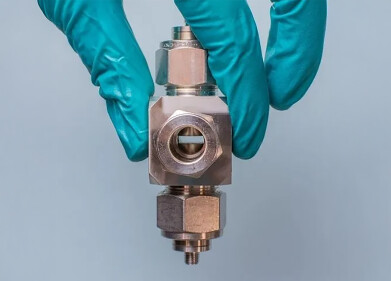-

-
 Estimated improvement in Cetane Number precision across a wide range of cetane numbers compared to the existing precision of the ASTM D613 method.
Estimated improvement in Cetane Number precision across a wide range of cetane numbers compared to the existing precision of the ASTM D613 method.
Analytical Instrumentation
CFR Engines Inc. leverages XCP™ Technology to drive performance advances and precision improvements for its F5 Cetane Rating Unit.
Dec 05 2019
CFR Engine’s (CFR) F5 Cetane Rating Unit is widely perceived as the globally accepted standard for determining and certifying the ignition quality of diesel fuels. For many technicians, XCP Technology remains the modern instrumentation of choice for cetane testing. CFR continues to apply advances in design, measurement, and control to its XCP Technology platform. The CFR F5 Unit operating with XCP Technology offers an improved operator experience with clear and easy to read digital displays of test data. It also features an intuitive computer interface that guides the user through a systematic process for performing cetane ratings and graphical displays of injection and combustion data assist in the precise monitoring of the unit and test whilst performing automated calculation of cetane numbers and documentation of test results in concise data reports.
The flexible expandability of the XCP system opens the door to further enhancements to the F5 Cetane Rating Unit that until very recently were not possible. For example, CFR is conducting development testing on an F5 cetane engine fitted with a modern high-pressure electronic fuel injection system. The use of a modern fuel injection system allows for greatly improved control over the quantity and timing of each fuel injection compared to the existing mechanical fuel system.
Fuel injection that is more consistent results in combustion events that are more consistent. Ignition delay (the amount of time between start of injection and start of combustion) is the fundamental characteristic of diesel combustion that is used to determine a Cetane Number rating. Using the precision of XCP Technology to control fuel delivery creates the cycle-to-cycle consistency between combustion events, and therefore a more precise measurement of Cetane Number.
The graph below compares the ASTM D613 repeatability of an existing mechanical fuel delivery configuration with preliminary test results of an XCP driven electronic fuel injection system. Also shown by the scale on the graph, another objective of the current development work is to expand the range of ASTM D613 to include fuels with higher Cetane Number. Ongoing testing indicates a greater than 50% improvement to the precision of the true engine based Cetane Number test of ASTM D613.
Digital Edition
PIN 25.5 Oct/Nov 2024
November 2024
Analytical Instrumentation - Picturing Viscosity – How Can a Viscometer or a Rheometer Benefit You? - Sustainable Grease Formulations: Evaluating Key Performance Parameters and Testing Method...
View all digital editions
Events
Dec 03 2024 Dusseldorf, Germany
Dec 08 2024 Anaheim, CA, USA
Turkey & Black Sea Oil and Gas
Dec 11 2024 Istanbul, Turkey
Dec 19 2024 Aurangabad, India
Jan 20 2025 San Diego, CA, USA


















